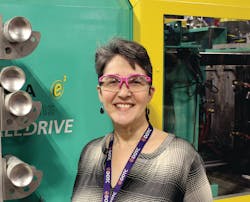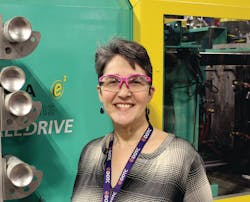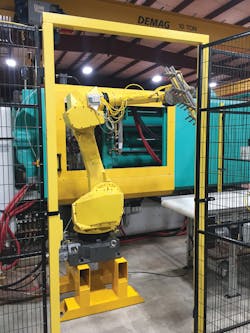Noble's Rogers touts automation
You and your husband founded Noble in October 2000. How did you get involved in the plastics industry?
Rogers: Scott worked in the oil industry and was developing a line of plastic products. He was having a hard time getting parts made to his specifications. I had taken a career break to have our children. We combined his vision and my re-entering the work force. We started a plastics manufacturing company to make parts that we know will work. We get great personal satisfaction from the creative process. We got a reputation with material and mold guys to do crazy stuff. When other molders failed to make the part, we made it. There was a lot of growth potential as industries transitioned from metal to plastics.
What challenges did you encounter as your business grew?
Rogers: Personnel. Not everybody is suited to manufacturing or intense deadlines in contract manufacturing. We are a critical link in many peoples’ supply chains. Also, getting our culture into a core value statement and using that culture to screen, hire, promote and fire.
Rogers: The cultural acceptance of plastics in the oil field. The oil industry had a complete disconnect with plastics. They wanted all-stainless-steel parts, not plastics. We had to demonstrate the capabilities of plastic.
What are some important milestones that your company reached through the years?
Rogers: After seven years, we owned our own building instead of renting. Selling our first automation system, which was a customized cutting press that would cut a variety of custom plastic cutouts for another company. Getting our second plant up and running. Creating a team-centered family culture.
When it comes to machinery, how do you make your purchasing decisions?
Rogers: My husband Scott and I are both mechanical engineers, so we are analytical. Initially, we bought based on machine reliability and longevity. Now, machine reliability is not a differentiating factor because they are all very good. It became more important to buy machines at the forefront of the industry, from those who are looking to develop new auxiliaries and innovations. We are now with Arburg. They try new things, such as ceramic and metal injection, long-fiber and talking with robots. We were impressed because we saw Arburg at a lot of technical presentations.
Your injection molding cells are fully automated. How many cells does this include?
Rogers: We have 13 injection presses, and almost all of them are Arburg. Our automation has standardized on Fanuc. We also design and build Fanuc robotic systems for other companies. We have 13 presses and 18 robots. We will do multiple robots on a cell, if needed.
Although there is a trend toward the use of more all-electric machines in injection molding, Noble does not have any. Why is that?
Rogers: We have several hybrids that we are very happy with. All-electric is not a great fit for our customers. We build a lot of bulky, thick-walled parts, and all-electric is not suited to that.
Tell us about the integration of IQMS and RJG technologies for monitoring systems.
Rogers: We are data hogs. We want to know everything that is happening in real time. We made a big commitment to RJG. We put eDart [process control] on all our machines, whether the customer has instrumented their tool or not. In many cases, we can demonstrate the value of scientific molding to the customer, but we use those systems to monitor and compare overall machine performance. We added IQMS to our business about 6 or 7 years ago, which gave us a real-time monitoring module. We have integrated real-time [monitoring] on every manufacturing cell. Now, we are working with Oracle to develop an Internet of Things product. We are using Oracle software to make intelligent predictions based on sensor data. The Oracle platform will sort through huge amounts of data to aid with intelligent manufacturing.
Noble invested in CNC machines, lathes and mills, so that the company could build its own end-of-arm tooling. Why was that important?
Rogers: Southern Louisiana is not a huge hub of plastics manufacturing, so we had to be highly autonomous. For automation, we decided to do it ourselves rather than wait for somebody to fly in to do it for us.
Part of your operation is lights-out. What does it allow you to achieve? What are the biggest challenges to achieving lights-out?
Rogers: We automate everywhere we can. It gives a better quality of life for owners and employees because we don’t have to man those shifts. You can head home at the end of the day and be confident many compliant parts will be ready to be shipped in the morning.
The challenge is finding a way to get the automation capable of the volume of finished goods needed. If you have a solid process, the machine will crank out parts every 12 seconds. The problem is, how do I keep the resin falling into the hopper every night and get the finished goods off the press? Some parts are large and bulky, so you might fill a box every 25 minutes. That strains the process. Robots can remove the parts, but people do quality inspection and maintenance. About 60 to 70 percent of our business is lights-out manufacturing. We may have 12 cells running lights-out, or we may only have three. It ranges from a low of 40 percent to a high of 90 percent.
Your company’s mission is “Dream it. Make it.” What does that mean?
Rogers: We are committed to work with inventors and visionaries in our industry. What is your dream? We will make parts for your dream at a price that is affordable. It may be lightweighting a system, electrical conductivity, or metal-to- plastics conversion.
Do you use 3-D printing for part design or production?
Rogers: We do, some. We use it for tooling fixturing and quality-control, such as a 3-D printed fixture for part inspection. We usually farm out making prototype tools.
To what do you attribute your company’s success?
Rogers: Passion, tenacity, our core values: Do what you say you are going to do. Help others succeed. Know that the products have to be right.
Do you, Scott or your company hold any patents?
Rogers: I have two or three. Scott and the design team have a couple dozen, including those they were included on from our customers’ patents. The customer owns the patent, but they named us the co-inventor.
Where do you see the injection molding industry 10 or 20 years from now?
Rogers: Clean and highly automated. All cells will have robots on them. To make high-yield, high-value efficient parts, you must have good technology. Plants can automate and survive or fall into the chaos of poor quality and inconsistent results.
Are you involved in any professional associations?
Rogers: The Manufacturers Association of Plastics Processors (MAPP) is a nationwide organization. I am a MAPP board member. We have regional events for sharing best practices. Our commitment is not just elevating our own people, but elevating the industry, as well, by sharing information, best practices and benchmark data. The rate of change is so fast and there is so much data on the process side that you must share best practices with the industry. Don’t be a poster on the wall. I’m very passionate about that.
How would you like to be remembered?
Rogers: I would like to be remembered as a person who cares. I care about my people, my clients and my industry. I hope that caring is remembered as genuine and what drives my choices.


